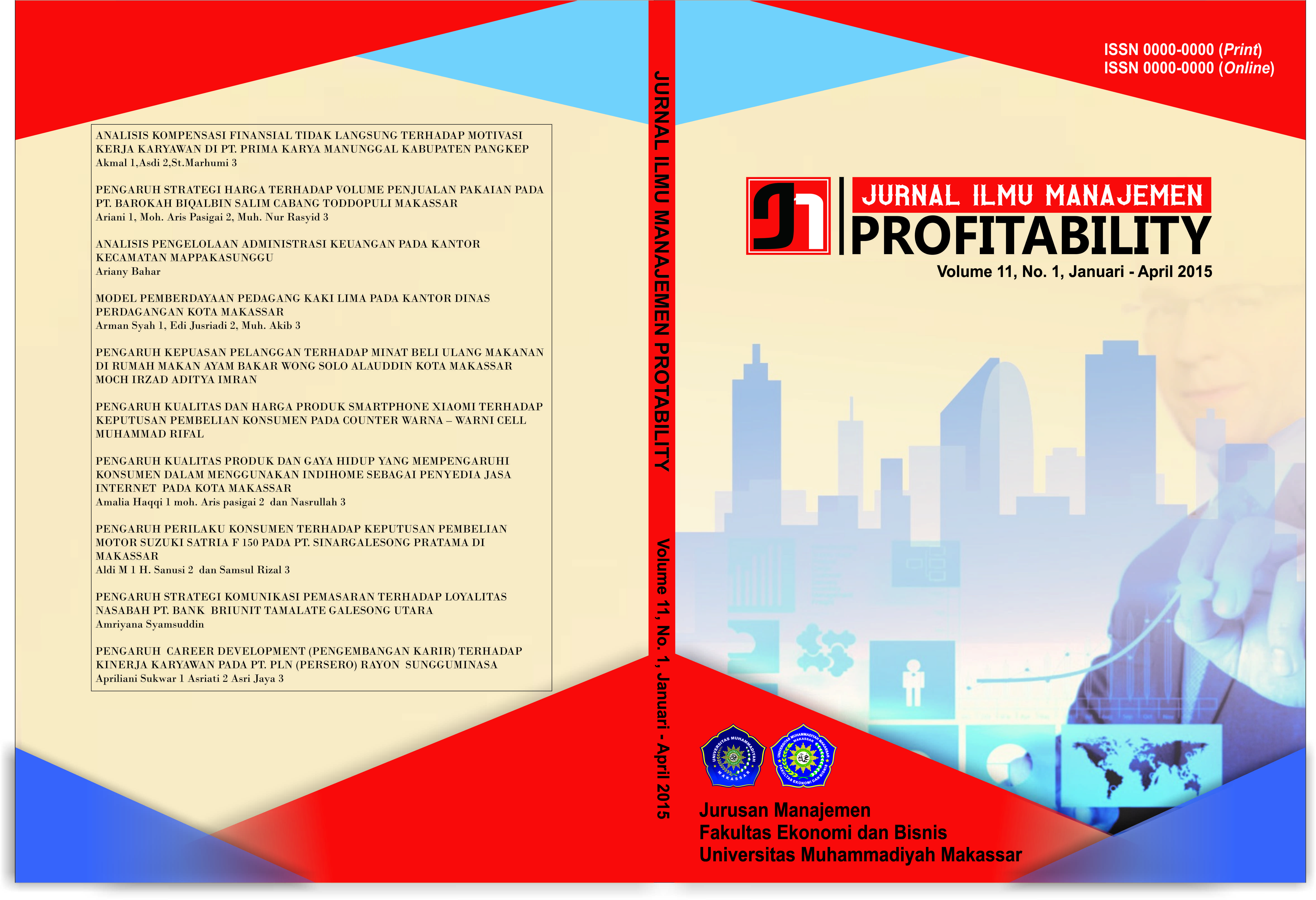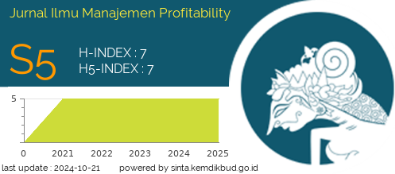PENGARUH DISIPLIN KERJA DAN LINGKUNGAN KERJA TERHADAP KINERJA APARATUR SIPIL NEGARA PADA KANTOR SEKRETARIAT DPRD KABUPATEN SIDENRENG RAPPANG
DOI: https://doi.org/10.26618/profitability.v3i2.6408
work discipline, work environment, ment and performance
Abstract
The objectives of this study are (1) to find out whether work discipline and work environment have a partial effect on the performance of the state civil apparatus at the secretariat office of the DPRD Sidendeng Rappang Regency. (2) To find out whether work discipline and work environment have a simultaneous effect on the performance of the state civil apparatus at the secretariat office of the DPRD Sidendeng Rappang Regency. Data collection techniques in this study are the method of observation, interviews, and literature study. In this study, the population is the state civil apparatus at the secretariat office of the DPRD Sidendeng Rappang Regency, totaling 35 people. For this study to provide generalizations with a very small error rate, and considering the population is only 35 people, this research uses a sampling technique, namely saturated sampling (census). Thus the number of samples in this study was 35 people. The results showed that (1) work discipline partially affected the performance of the state civil apparatus at the secretariat office of the DPRD Sidendeng Rappang Regency. where the results obtained by work discipline have a value of 4.062 > t table. 2.024 and the significance level of t is less than 0.05 (sig = 0.000 < 0.05). (2). The work environment has a partial effect on the performance of the state civil apparatus at the secretariat office of the DPRD Sidendeng Rappang Regency. Where the results obtained in the work environment have an account value of 3.182 > t-table 2.024 and the significance level of t is less than 0.05 (sig = 0.003 <0.05). (3). Work discipline and work environment simultaneously (simultaneously) affect the performance of the state civil apparatus at the secretariat office of the DPRD Sidendeng Rappang Regency. It can be seen that work discipline and work environment provide a calculated F value of 123.048 which is greater than the F table which is 5.18 with a probability value of 0.000 which means it is below the significance value of 0.05.
References
Aditya Nur Pratama, 2016, Skripsi, Pengaruh Lingkungan Kerja Dan Disiplin Kerja Terhadap Kinerja Karyawan PT. Razer Brothers,Tanah Abang Jakarta Pusat, Universitas Indonesia, Jakarta.
Anwar. 1991. Evaluasi Kinerja Sumber Daya Manusia, PT.Reflika Aditama, Bandung.
Anwar Prabu Mangkunegara, 2005. Evaluasi Kinerja Manajemen Sumber Daya Manusia, Refika Aditama, Bandung
, 2009, Manajemen Sumber Daya Manusia Perusahaan. PT.Remaja Rosda Karya, Bandung.
Dessler. 1997, Manajemen Sumber Daya Manusia, PT.Prenhalindo, Jakarta.
Foster, Bill. 2001. Pembinaan Untuk Peningkatan Kinerja Karyawan, PPM : Jakarta.
Handoko, T.Hani. 2011. Manajemen Personalia dan Sumber Daya Manusia. Liberty, Yogyakarta.
Kartono, Kartini. 2000. Pemimpin dan Kepemimpinan. Rajawali Jakarta.
Malayu SP Hasibuan.2009. Manajemen Sumber Daya Manusia, PT.Bumi Aksara. Jakarta.
Mangkuprawira, Syafri, 2003. Manajemen Sumber Daya. Orasi Ilmiah Guru Besar Tetap.
Nasution S. 2006. Metode Penelitian. Ghalia Indonesia. Jakarta
Simamora. 1995. Kebijakan Kinerja Karyawan. BPFE, Yoyakarta.
Soedarmayanti. 2005. Manajemen Sumber Daya Manusia. PT. Refika Aditama, Bandung.
Siagian, Sondang P. 1998. Pengembangan Manajemen Sumber Daya Manusia di Indonesia. Ganesha, Bandung.
Sarwono P. 1998. Pengukuran Efektifitas Kerja Pegawai. Andi Offset. Yogyakarta.
Aditya Nur Pratama, 2016, Skripsi, Pengaruh Lingkungan Kerja Dan Disiplin Kerja Terhadap Kinerja Karyawan PT. Razer Brothers,Tanah Abang Jakarta Pusat, Universitas Indonesia, Jakarta.
Anwar. 1991. Evaluasi Kinerja Sumber Daya Manusia, PT.Reflika Aditama, Bandung.
Anwar Prabu Mangkunegara, 2005. Evaluasi Kinerja Manajemen Sumber Daya Manusia, Refika Aditama, Bandung
, 2009, Manajemen Sumber Daya Manusia Perusahaan. PT.Remaja Rosda Karya, Bandung.
Dessler. 1997, Manajemen Sumber Daya Manusia, PT.Prenhalindo, Jakarta.
Foster, Bill. 2001. Pembinaan Untuk Peningkatan Kinerja Karyawan, PPM : Jakarta.
Handoko, T.Hani. 2011. Manajemen Personalia dan Sumber Daya Manusia. Liberty, Yogyakarta.
Kartono, Kartini. 2000. Pemimpin dan Kepemimpinan. Rajawali Jakarta.
Malayu SP Hasibuan.2009. Manajemen Sumber Daya Manusia, PT.Bumi Aksara. Jakarta.
Mangkuprawira, Syafri, 2003. Manajemen Sumber Daya. Orasi Ilmiah Guru Besar Tetap.
Nasution S. 2006. Metode Penelitian. Ghalia Indonesia. Jakarta
Simamora. 1995. Kebijakan Kinerja Karyawan. BPFE, Yoyakarta.
Soedarmayanti. 2005. Manajemen Sumber Daya Manusia. PT. Refika Aditama, Bandung.
Siagian, Sondang P. 1998. Pengembangan Manajemen Sumber Daya Manusia di Indonesia. Ganesha, Bandung.
Sarwono P. 1998. Pengukuran Efektifitas Kerja Pegawai. Andi Offset. Yogyakarta.
Tri Widari, 2016, Jurnal, Pengaruh disiplin dan lingkungan kerja terhadap kinerja pegawai.(Studi pada Badan Kepegawaian Daerah Daerah Istimewa Yogyakarta), Universitas Negeri Yogyakarta, Yogyakarta.
Wirawana. 2001. Kriteria Menilai Kinerja Organisasi Pelayanan Publik. Joyo Wisesa. Bandung.
Tri Widari, 2016, Jurnal, Pengaruh disiplin dan lingkungan kerja terhadap kinerja pegawai.(Studi pada Badan Kepegawaian Daerah Daerah Istimewa Yogyakarta), Universitas Negeri Yogyakarta, Yogyakarta.
Wirawana. 2001. Kriteria Menilai Kinerja Organisasi Pelayanan Publik. Joyo Wisesa. Bandung.
Downloads
Published
Issue
Section
License
Authors who publish with Jurnal Ilmu Manajemen Profitability agree to the following terms:
Copyright of the articles remains with the authors.
Authors grant the journal the right of first publication with the work simultaneously licensed under a Creative Commons Attribution-NonCommercial 4.0 International License (CC BY-NC 4.0). This license allows others to:
Share (copy and redistribute the material in any medium or format)
Adapt (remix, transform, and build upon the material)
as long as they give appropriate credit to the original author(s) and source, provide a link to the license, and indicate if changes were made. Non-commercial use only.
Authors are permitted to:
Distribute their published work (e.g., post it to an institutional repository or publish it in a book), with an acknowledgment of its initial publication in this journal.
Enter into separate, additional contractual arrangements for the non-exclusive distribution of the journal’s published version of the work (e.g., post it to a class website or institutional archive).
For permissions to use the content published in this journal beyond the scope of the license (e.g., commercial purposes), please contact the editorial office via the journal email.
License Details:
This journal is licensed under a Creative Commons Attribution-NonCommercial 4.0 International License (CC BY-NC 4.0).












